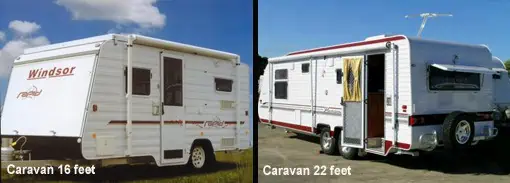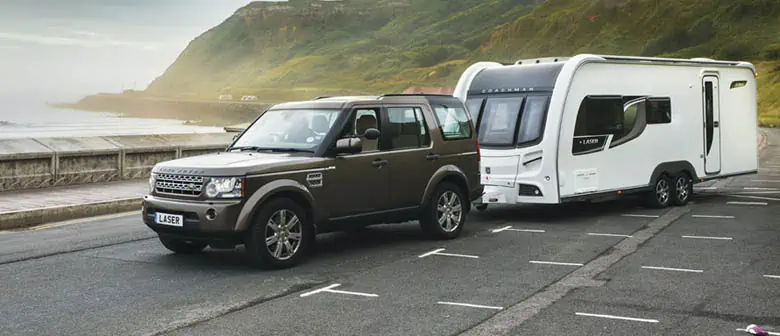Tips on Buying a Caravan
I’ve put together some ‘tips on buying a caravan’, and there are several things to consider. For instance, are you intending to travel mostly on sealed roads, or do you require a van that can go off-road?

Off-road caravans have higher clearance from the ground, combined with heavy-duty suspension and chassis. This enables them to travel through creek beds and over rough rocky terrain, cope with harsher road conditions, and reduce dust and water entry. They generally have larger water tanks, a space for extra fuel cans, spare wheels, and two gas bottles and windows tinted to cope with the hot temperatures of the outback.
If you lack common sense, don’t take a caravan into remote areas or the Outback! Constantly monitor weather conditions so you don’t become stranded, watch and read the state of the road, and keep a close eye on the van. Collect intelligence from local people, research your trip, and if roads deteriorate and your van is getting a hammering… go back.
What are you buying a caravan for? Are you planning long trips, short trips, with kids, without kids, or mainly staying in caravan parks? Answering some of these questions will determine what size caravan you need, its features, and the layout that will work best for you. Generally, the smaller the caravan, the easier it is to tow. I would appreciate it if you could keep your vehicle’s towing capacity in mind when buying a caravan.
Tips on Buying a Caravan Checklist
The following is a bit of a checklist that should be considered when buying a caravan, or for that matter, a camper-camping trailer:
- How long do you intend to live in it?
- How many people will sleep in it?
- Will you travel on the road, off, or on 4×4 tracks and trails?
- Do you require alternative power, such as solar panels and dual batteries?
- Do you need an onboard toilet and shower?
- Will you need an awning or a full annexe?
- Do you intend to cook inside, outside or both?
- Do you need plenty of storage for personal items?
- Will you be carrying bicycles and other large objects?
- Do you intend to use it at home for additional accommodation?
- Is height a significant consideration for storage?
Towing Weight
You’ll need to consider the following information when you purchase a van.
- The tow vehicle’s allowable (braked and unbraked) towing weight.
- The tow ball weight rating.
- Any additional equipment required for towing, such as a transmission or power steering oil cooler fitting in your tow vehicle.
- Manufacturer specifications for the type and rating of the tow bar required for specific towing weights.
- Tare and gross weight of the caravan, camper or tent trailer you plan to tow.*
*Tare is the caravan’s weight after manufacture (also considered a dry weight). Gross is the all-up weight the axles are legally allowed to carry. The difference (weight rating) between tare and gross varies from manufacturer to manufacturer, so always check this.
This list is only a few suggestions when buying a caravan, and you should develop your wishlist in conjunction with the realities of towing capability, budget, height or other limitations.
Tips on Buying a Caravan – Secondhand
- Check for rust, especially around the chassis and underneath the van. If there is fresh paint there, it could sign a quick cover-up. Rust is a big problem with caravans and is very expensive to fix.
- Check everything, from the cooker to the fridge, beds and windows; if you don’t, you’re bound to find something that bites you later. Even if nothing significant is found, minor hitches can be a good way to bargain down prices.
- Water leaks and dampness. Check for leaks from pipes in the van; also look around windows and the roof for signs of water damage and, thus, signs of leakage. If there is a smell of dampness in the air, then there could also be a problem. A leaking caravan is a miserable place to be.
- Check the tow hitch; ensure it moves easily and that the handbrake holds the van when on. You don’t want to be slithering down the hill into the lake, now do we?
- Is the van the right size for you? Can it fit the kids and yourselves without getting cramped?
- Check to ensure the van is not too big for your car. Causing stress to your vehicle, pulling a large van is a quick route to expensive engine problems.
- If you’re new to caravanning, take a test pulling the van before you go on holiday. Towing a caravan calls for a more cautious approach to driving.
- As with most secondhand items, always view a good number before making a decision; chances are the first one isn’t the best deal. Don’t get goaded in by the seller trying to force a quick sale by suggesting there are hoards of other buyers just waiting to snap up their dodgy caravan.
- Haggle if possible, and don’t start at the price you want to pay, always start well below and bargain up.
- If you’re unsure whether a caravan is for you, rent one for a few weeks to see if the lifestyle suits you before buying a caravan.
- Buying a used caravan is essentially a case of ‘Buyer Beware’. The onus is on you to ensure the caravan is sound; getting an experienced person or caravan dealer to inspect the caravan thoroughly is a good idea.
- When viewing a caravan, you should satisfy yourself that the vendor is knowledgeable about the caravan and has a legitimate reason for the sale. Ask yourself whether the price is similar to other caravans on the market – if a deal looks too good to be true, it probably is. You should always arrange to view the caravan at the seller’s home address and never in a car park or other public location.
- Check that the vehicle’s identification numbers stamped into the bodywork or on the chassis plate matches the registration papers.
This page on tips on buying a caravan is a start. Buying is a significant investment; please ensure you research thoroughly. Caravan WA is a great place to visit to plan trips and gather general information about travelling in Western Australia.

